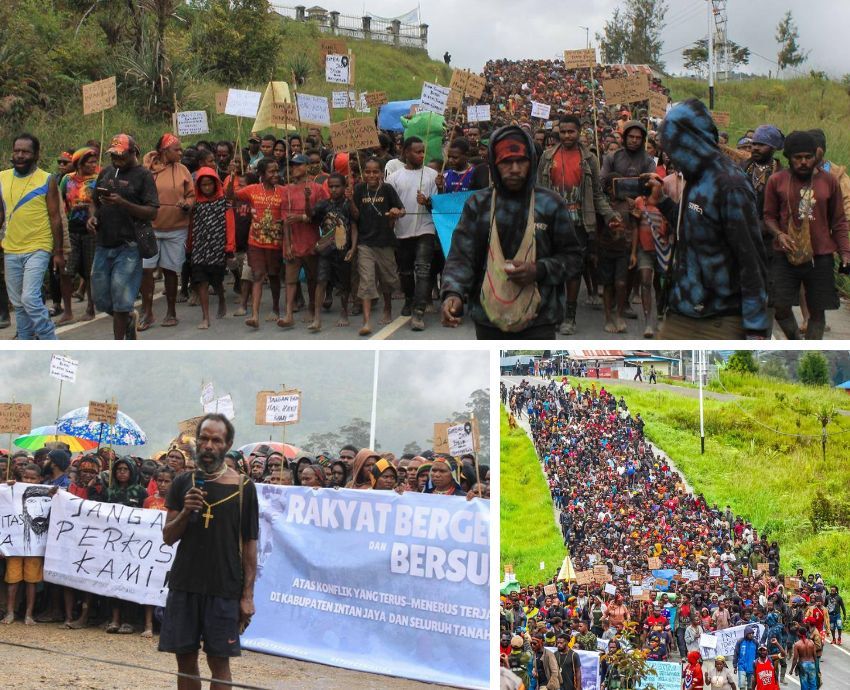
Indonesian security forces killed 15 West Papuans, including 12 civilians, during a military operation in Soanggama Village in the Intan Jaya Regency in occupied West Papua.
West Papuans took to the streets of Intan Jaya on October 28 to condemn the killings and demand an end to militarisation.
The Australian West Papua Association (AWPA) opposed the killings and reported that security forces “conducted house to house searches and opened fire in an indiscriminate fashion resulting in 15 deaths.
“According to community sources, soldiers buried most of the bodies with some still to be found.”
AWPA spokesperson Joe Collins said: “As with previous military operations, local people fled in fear of their lives. In this case, up to 145 residents fled from Soanggama, Janamba and Kulapa.”
The Indonesian occupying forces claim that the dead were members of the West Papua National Liberation Army (TPNPB) and were killed in a firefight. However, this was contradicted by TPNPB spokesperson Sebby Sambom, who said that only three of the dead were TPNPB members.
Drawing on reports from Jubi, Human Rights Monitor and civil society groups, AWPA said local church leaders and civil society groups also dispute the official narrative: “The Intan Jaya Conflict Mediation Team [IJCMT] identified at least nine civilians, including a deaf man and a housewife who died while fleeing.”
IJCMT leader Yoakim Mujizau visited Soanggama Village to identify victims and gather information from residents who witnessed the incident. The team also received information from members of the Indonesian National Armed Forces stationed there.
According to AWPA, the victims were buried by the taskforce in different locations. Two were buried in Soanggama Hamlet in front of the Protestant church. Six were buried in Dusandigi Hamlet, Soanggama Village, and one woman was buried in Jembatan Hamlet, on the Wuisiga River. The bodies of the other six victims have not yet been found.
“The security forces are still unwilling to provide information," Mujizau said. "Where are the shooting victims? And where are they buried? So we are still investigating the whereabouts of the bodies, and we have not yet identified them.”
Collins said that while the Indonesian military claims it reclaimed/liberated a village from the TPNPB, “the only liberation that needs to be done is the liberation of West Papuans from the oppression of the Indonesian security forces”.
Collins condemned the Australian government for its silence on the killings and its ongoing training and joint military exercises with the Indonesian occupying forces.
“We have a massacre of Papuan civilians on our doorstep and there is no comment from Canberra on the incident. No concern about the ongoing human rights abuses, the military operations or the death of civilians in the territory.”
Collins called on the Australian government to “become involved and put pressure on Jakarta to control its military in West Papua, as a first small step”.
Meanwhile, human rights advocates have growing concerns following the signing of a Comprehensive Economic Partnership Agreement (CEPA) between the European Union and Indonesia on September 23. The Diplomat said the “CEPA includes a duty-free quota for crude palm and palm kernel oil” and supplies of gold and copper from West Papua’s Grasberg mine, the largest gold mine and third-largest copper mine in the world.
Indonesia’s military-backed Food Estates Program in occupied West Papua is bulldozing 2 million hectares of rainforest to set up sugarcane, rice and palm oil plantations, resulting in displacement of and violence against West Papuans.
Benny Wenda, a Papuan living in exile in Britain, told the Diplomat that the EU is “authorising ecocide and genocide in West Papua” and “giving Indonesia a mandate to deploy their troops, control our natural resources, and destroy our forests”.
Australian-based Indonesian human rights advocate Veronica Koman said that while the West Papuan resistance movement is “getting stronger and larger every day due to its popularity among Papuans, despite Indonesia’s brutal effort to crush them … [t]he difference is now the European public is directly implicated in this bloodshed.”